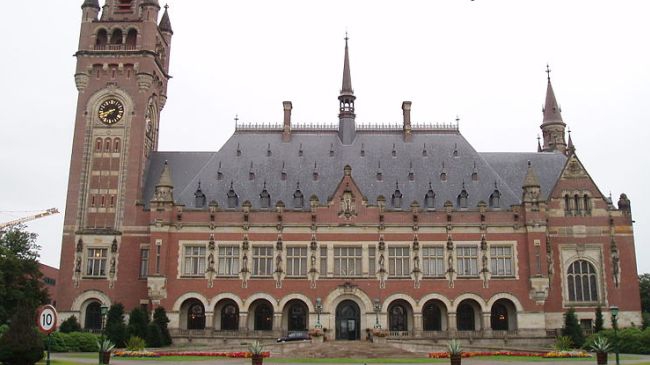 A general view of the headquarters of the International Court of Justice in The Hague.[/caption]
A general view of the headquarters of the International Court of Justice in The Hague.[/caption]A group of renowned international jurists have underscored the illegitimacy of US-led international sanctions imposed on the Islamic Republic over its peaceful nuclear energy program.
The issue of Iran was raised at the �Symposium on Unilateral Sanctions and International Law: Views on Legitimacy and Consequences,� which was held in The Hague on July 11.
Iran�s Ambassador to the Netherlands Kazem Gharibabadi said the participants in the event included international tribunal justices, professors of international law from European and Asian universities as well as researchers.
Abdul G. Koroma, former International Court of Justice (ICJ) Judge and ten senior international jurists discussed the issue of unilateral sanctions from the standpoint of international law.
He said no country or organization is legally authorized to adopt unilateral sanctions, noting that the sanctions imposed on a government for punishment lack legitimacy.
Hisae Nakanishi, professor of the Doshisha University Graduate School of Global Studies, said the sanctions have only made life more difficult for Iranians. She suggested dialogue with Iran instead of the imposition of sanctions.
Paul de Waart, professor Emeritus of International Law at VU University
Amsterdam, said sanctions that affect basic human rights contravene international law.
Maya Lester, Barrister with Brick Court Chambers, noted that the European Union has failed to provide evidence of diversion in Iran�s nuclear energy program to justify sanctions against the Islamic Republic�s banking sector.
Carlos J. Arg�ello Gomez, Nicaragua's Agent in cases before the International Court of Justice, said Iran can take the case of unilateral sanctions to international arbitration.
At the beginning of 2012, the United States and the European Union imposed new sanctions on Iran�s oil and financial sectors with the goal of preventing other countries from purchasing Iranian oil and conducting transactions with the Central Bank of Iran. The sanctions came into force in early summer 2012.
In November 2012, the US Senate approved a new round of sanctions against Iran's energy, ports, shipping and shipbuilding sectors.
The illegal US-engineered sanctions have been imposed based on the unfounded accusation that Iran is pursuing non-civilian objectives in its nuclear energy program.
Iran rejects the allegation, arguing that as a committed signatory to the Non-Proliferation Treaty and a member of the International Atomic Energy Agency, it has the right to use nuclear technology for peaceful purposes.
By Press TV
The Iran Project is not responsible for the content of quoted articles.











